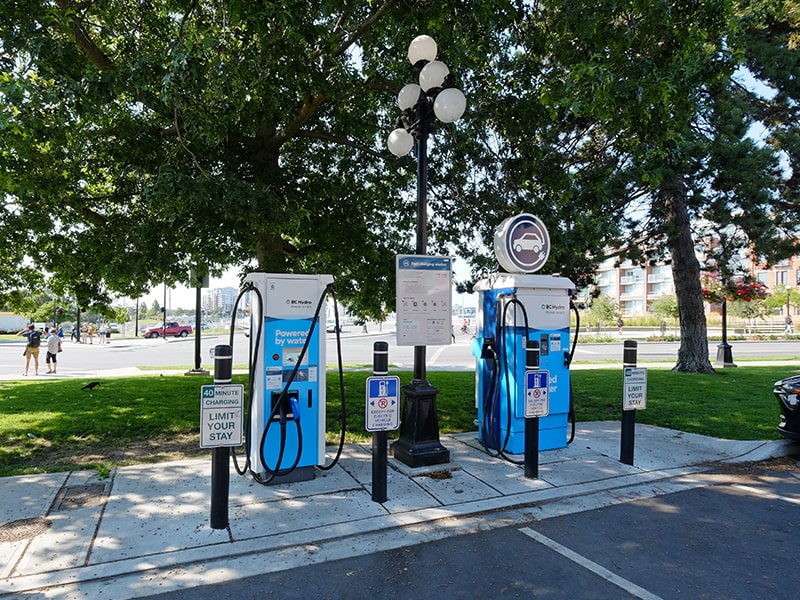
Dan Caesar sees great potential for B.C. to follow in the footsteps of Norway’s clean tech leadership. And he could be right.
For a number of reasons, it’s oh-so-tempting to compare the clean energy paths of Norway and British Columbia (B.C.), Canada.
Each boasts a clean energy advantage, leaning heavily on hydroelectric power for electricity: B.C. at 87% and Norway at 88%. And while the province of B.C., located on Canada’s west coast, is about 2.6 times the size of Norway, the region’s populations are almost identical at about 5.4 million.
While most Norwegian cities sit about 10 degrees north of B.C.’s major communities, they’re all in northern regions, with similar temperatures and heating needs. And thanks to climate change, both are near the top of the list of areas where homes and businesses are facing the biggest increase in the number of days that require cooling.
And then there are electric vehicles. When it comes to EV adoption, no country in the world beats Norway, where more than 79% of new car registrations in 2022 were for battery electrics. By comparison, B.C. looks to be a laggard at only 18% of new car sales going electric, but that 18% isn’t just the highest in Canada, but makes B.C. the EV adoption leader in North America.
So it’s no surprise that Fully Charged selected Vancouver as the location of its first Fully Charged LIVE Canada show on 8-10 September at the Vancouver Convention Centre.
“Why can’t British Columbia imitate what’s happened in Oslo?,”
asks Fully Charged CEO Dan Caesar.
“For me, Norway is a clear model for B.C., almost like there should be a twinning of Oslo and Vancouver. There are similarities in climate as well as in wealth.”
That idea is not lost on the Government of B.C. or BC Hydro, the public electrical utility that powers the province with its large integrated hydroelectric system that generates 98% clean electricity. and promotes air-source heat pumps to help meet the province’s aggressive climate targets. In 2021, BC Hydro adopted an electrification plan that outlines how it will meet the goal of reducing greenhouse gas emissions by 900,000 tonnes by April 2026. The plan includes a focus on new programs and incentives to help British Columbians make the switch from fossil fuels to clean hydroelectricity to power their homes, businesses, and vehicles.
“Stop Burning Stuff,”
the clean energy mantra Fully Charged embraces, is not yet in vogue in B.C. But in practice, it’s happening.
“Vancouver’s been on our list for awhile, but we’re going there at least two to three years earlier than we originally intended,”
says Caesar when asked how Vancouver got chosen for the Canadian show.
“It was BC Hydro’s leadership that brought us to Vancouver. They had the foresight to get in touch with us and say, ‘We want a show here’.”
Heat pumps and EVs on the front lines of electrification
BC Hydro recently installed the 150th fast charger in its EV public charging network, a mix of primarily 50-kilowatt stations and an increasing number of 100-kilowatt chargers in cities and along major highways.
So while Norway had a big head start in EVs – electric vehicles in Norway outnumbered those in B.C. 30 to 1 back in 2015 – charging infrastructure and rebate programs in B.C. are gradually closing that gap.
Heat pumps are also gathering momentum in B.C., the result of BC Hydro campaigns and combined provincial and federal rebates of up to $11,000 for the purchase of heat pumps in homes. They’ve also become attractive because they offer cooling in a province that’s seeing increasing spring and summer temperatures, including a record-setting “heat dome” event in 2021 in which highs eclipsed 40 C in many areas of B.C.
Still, there is reticence around heat pumps for some homeowners in B.C., where 39% of homes are heated by natural gas and another 30% by electric baseboard heaters. Despite rebates and rapid improvements in heat pump technology, many customers are still hesitant to make the switch. And concerns remain – among customers and HVAC contractors alike – in the colder areas of B.C. There are doubts that heat pumps can keep homes warm when temperatures dip below 25 C and 30 C.
Compare that to Norway, where rebates and technology awareness have led to the highest heat pump adoption rate in Europe. There are now more than 600 heat pumps for every 1,000 Norwegian homes, even as adoption lags in other European countries including the UK, and in North America.
“Most British Columbians don’t realize that home heating is one of the biggest carbon emitters,”
BC Hydro CEO Chris O’Riley told a Surrey (B.C.) Board of Trade audience last fall.
“Heating a typical single-family home with gas releases about two tonnes of carbon dioxide, and that’s equivalent to driving a gas-powered vehicle 8,000 kilometres a year.”
The good news, added O’Riley, is that BC Hydro saw application for its heat pump rebate program nearly double from 2,200 to 4,200 between 2021 and 2022. And there are now more than 200,000 homes in British Columbia using the technology.
While B.C.’s adoption of both EVs and heat pumps may lag behind Norway’s, it’s helping the Canadian province in its progress to Stop Burning Stuff, or at least burning less of it.
“If you look at carbon emissions and climate change, the key culprit is the burning of fossil fuels,”
says Fully Charged CEO Caesar.
“I think we’re in quite a powerful position to get together with others, whether it’s BC Hydro or its with other YouTubers, to give a powerful boost to the importance of clean energy.”
And if Fully Charged LIVE Canada helps B.C. to become North America’s equivalent of Norway, consider it mission accomplished.
About the author
Rob Klovance is a former sports reporter who now works as a Vancouver-based freelancer specializing in sustainability. He contributes regularly to bchydro.com and spends more time on his bike than in his car.






